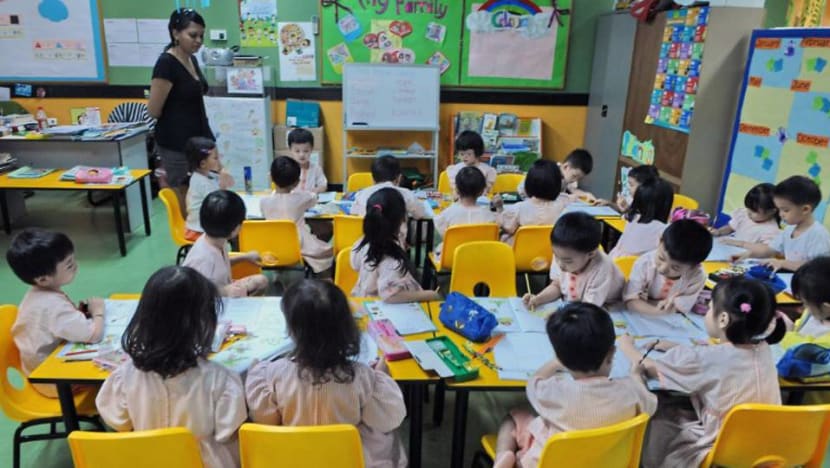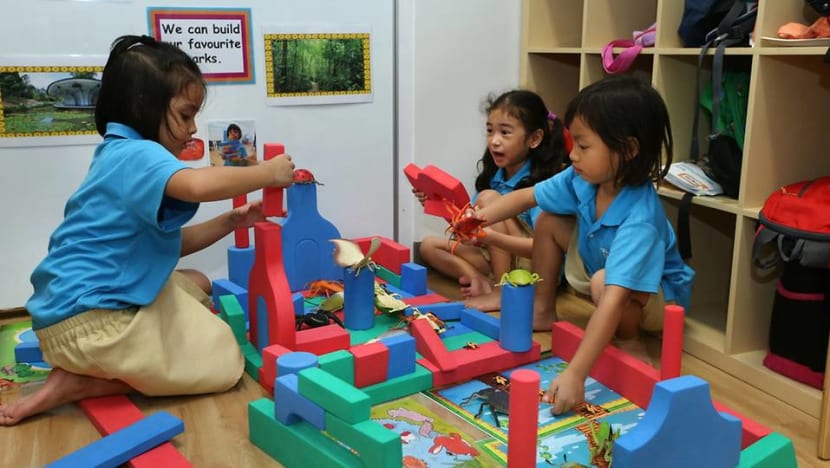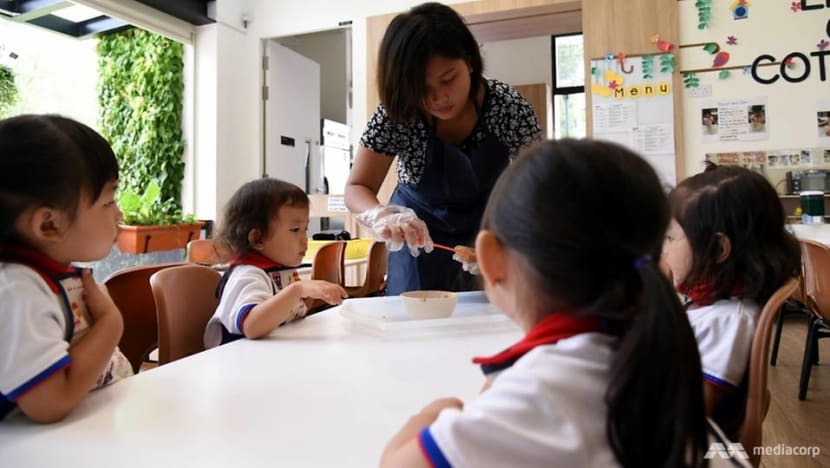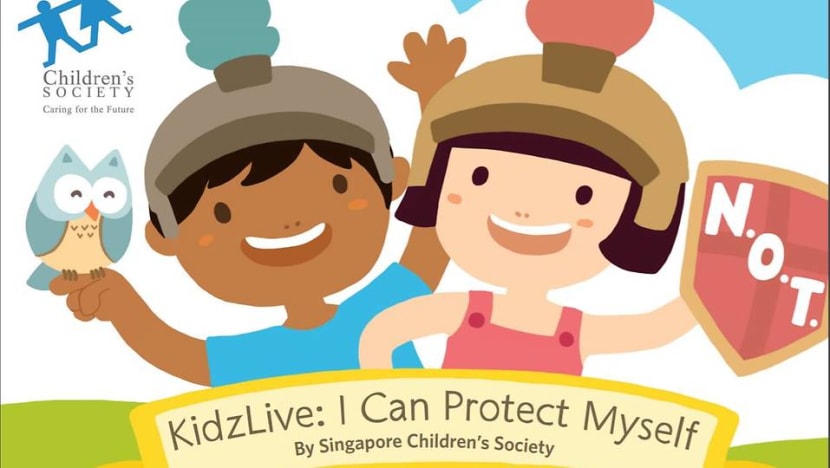commentary Commentary
Commentary: Why we need to teach pre-schoolers protective skills to stop child sexual abuse
The recent spate of child sexual abuse cases shows we need to empower children and this needs to start at pre-school, says the vice-chairman of the Singapore Children’s Society.

A file photo of a pre-school teacher with her class. (Photo: AFP)
SINGAPORE: It is horrifying to read about the recent spate of child sexual abuse cases being brought to court, especially those involving fathers sexually abusing their daughters.
In 2019, the Ministry of Social and Family Development (MSF) investigated 210 child sexual abuse cases, which account for about 20 per cent of all child abuse and neglect investigations mounted.
This trend has been observed for the last three years. Statistics for 2020 have not been released.
In a 2017 news report, MSF revealed that close to 40 per cent of child abuse and neglect cases involved children below seven.
READ: Commentary: Why child sexual abuse can often be a sustained, hushed up ordeal over many years
One also must note that MSF figures only accounts for intra-familial sexual abuse cases, while the police handles extra-familial cases. Yet in this, about 40 per cent of sexual assault cases reported to the police from 2017 to 2019 involved victims below the age of 16.
The figures clearly show the young in our midst are at risk. The consequences of sexual assault are devastating, lasting well into adulthood for many survivors. This is a pattern we must break.
And much will hang on how we empower our children to speak out about sexual abuse.
SEXUALITY EDUCATION EARLIER
In mainstream primary schools, sexuality education officially begins in Primary 5, when the child is 11. The focus of this is on pubertal changes happening in the body, relationships with the people around them, and sexual abuse prevention.
For lower primary students, lessons on safety and safeguarding, including having students learn to protect themselves from sexual abuse, are loosely incorporated into the Form Teacher Guidance Period.
READ: Commentary: Let’s move away from caning and corporal punishment for our kids
But more can be done. Body safety teaching can start even earlier, at the pre-school age. And to ensure access to such education, these messages should be integrated into all pre-school curricula.

Body safety is part of sexuality education, and it takes a wider perspective than sex education, which is more narrowly concerned with explaining the act of sex. Sexuality education focuses on equipping children with the skills to keep themselves safe, and to make responsible decisions about their social and sexual relationships.
This suggestion of starting young is not novel. UNESCO’s international technical guidance on sexuality education begins at age five. It recommends for such curricula to be incremental in age and be developmentally appropriate.
In New Zealand, a national school-based personal safety programme, Keeping Ourselves Safe, had been implemented for more than 30 years for children aged five to 17.
WHY WE SWITCHED OUR OUTREACH TO PRESCHOOLS
Singapore Children’s Society started conducting a child sexual abuse prevention programme, KidzLive: I Can Protect Myself, in 2000. In the earlier years, we reached out to primary school children, but we have switched the focus of our efforts in the last decade to children in the early childhood stage.
Younger children are even more vulnerable to sexual abuse due to lack of knowledge, and such education was almost non-existent in our pre-school classrooms.
READ: Commentary: When should children be allowed to have their own mobile phones?
The key elements in our programme are to guide children to be aware of where their private body parts are, use the proper terms for these parts, to identify good or bad touches and inappropriate actions, and to tell a trusted adult should sexual abuse happen.
In 2015, we ran a pre-post programme evaluation with a sample size of 250 pre-schoolers and found that these children aged four to six years old were able to pick up the concepts described above.
In particular, they had significant learning in the identification of their private body parts, and the strategies to take— summarised into the N.O.T. rules—Say No, Walk Out, Tell a Trusted Adult— if somebody touches them inappropriately.
These results show that with the right approach, language and explanation tailored to the children’s cognitive level, they are able to pick up body safety messages.

We also engage parents and train pre-school educators with the hope of creating a multiplier effect to reach more children. To date, we have educated more than 11,000 pre-schoolers, trained 530 pre-school educators, and engaged more than 1,000 parents.
Compared against an average birth cohort of 40,000, we have reached just a tiny fraction of our young children. We do slightly better with training teachers, reaching more than 3 per cent of the 17,000 educators based on our 2018 figures.
LIMITATIONS OF PARENTS
Ideally, all parents should be empowering their young ones with body safety skills such that children know what to do if they encounter unsafe situations.
In reality, this ideal falls short.
In a survey conducted in 2020 by the Association of Women for Action and Research (AWARE) and the independent research agency, Blackbox Research, almost 70 per cent of the 564 parents surveyed believed they were the best persons to teach their children about sexuality.
READ: Commentary: When children say they’ve been sexually abused, believe them
Yet, only about half of them were comfortable to do so. The results further revealed that many parents lacked the tools and knowledge to begin such conversations.
These findings corroborated with our interactions with parents. Many find it awkward to talk about sexuality-related matters, and simply do not know how to start.
Then there will always be a handful of cases where the parents are the ones who perpetuate the sexual crimes themselves.
Needless to say, this group will never engage in such education for their children.
MAKE PROGRAMMES PRE-SCHOOL-BASED
This is where school-based child sexual abuse prevention programmes can be greatly beneficial. In addition to being able to reach masses of children, research has shown that school-based programmes are effective in increasing the protective knowledge and skills of children.
Having a formal structure to deliver body safety messages from pre-school until primary school would mean that children’s protective knowledge and skills will be expanded, reinforced, and retained over time. In doing so, no child will be left out.
For children who are experiencing abuse in their homes, having someone outside of their family to talk to and provide support can be a lifesaver. We have encountered a handful of sexual abuse disclosures when conducting the KidzLive programme.

These disclosures, which were flagged to either the Child Protective Service or Early Childhood Development Agency (ECDA) for further intervention, demonstrate that young children can speak out against abuse if given the right knowledge and opportunity, and the abuse can be ended earlier.
In some of the cases seen locally, disclosures came to light when children talked about these incidents with their teacher or school counsellor.
THE TIPPING POINT
Through our decade of work in the pre-school sector, we have encountered our fair share of challenges. Many times, these can be traced to adults’ resistance against what they do not fully understand.
They wrongly imagine that sexuality education is teaching children about the birds and the bees. After observing the KidzLive programme, however, teachers and parents understand what body safety education is, and understand the necessity and importance.
READ: Commentary: After the craziest year, teachers start first day of school with nervous apprehension
But even so, practical constraints of not having enough time outside of curriculum to cover these skills means that body safety education often gets squeezed out.
Challenges aside, we are also greatly encouraged by the progress that have been made.
Pre-schools have allowed us into their spaces to talk to young children about body safety and have rallied their parents to attend our talks. ECDA has listed our training programme as a continuing professional development course for educators since 2017. This has opened doors for us to inform and persuade educators on the importance of body safety skills.
The National Institute of Early Childhood Development has worked with us to integrate content on child sexual abuse prevention into the training curriculum for trainee teachers.
These developments point to the ground warming up to the idea of delivering sexual abuse prevention messages to our young children.
We seem to be on the cusp of a tipping point, and what is lacking is a coordinated effort, or a body to take the lead, for such a curriculum to be established and implemented by all pre-school operators.
Reading the sordid details of child sexual abuse cases, we can continue to lament about how societal and personal morals are being eroded and castigate the perpetrators who are brought to justice.
But we must do much more than that. No child should be subject to sexual abuse, and if we believe that, we can accept the importance of sexuality education from young.
Education has shown to be an effective tool to break the cycle of child sexual abuse and we should not wait until things become much more dire before making the move to shift sexuality education and body safety awareness into pre-school.
Professor Ho Lai Yun is Chairman, Research and Advocacy Standing Committee and Vice Chairman of the Singapore Children's Society. For information on KidzLive, refer to this booklet.














